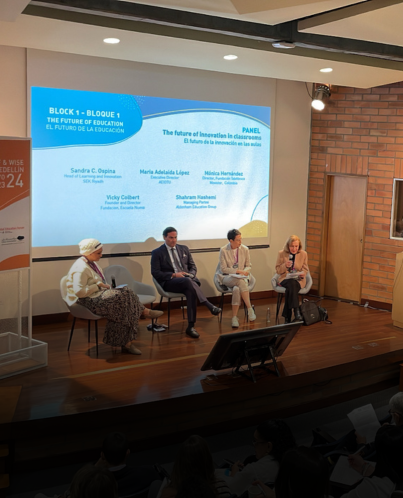The Education Trends To Watch Out For In 2023
Schools have been transformed over the last few years, thanks to education trends such as the rise of online learning. Technology – and the effects of the COVID-19 pandemic – has had a huge impact on the education sector in recent years, and things don’t look to be slowing down in 2023, with new trends looking to make teaching more adaptable and accessible for both teachers and students.
Nano Learning
One of the biggest education trends that you can expect to see more schools adopting over the next twelve months is nano learning. This teaching method is designed to make complex subjects more engaging and interesting for students, by breaking them up into lessons that are short, simple, and more ‘bite-size.’ The rise of Snapchat and TikTok has shown that people want information delivered to them clearly and concisely. Nano learning aims to do that in the classroom by using different types of media including videos, images, animations, and interactive games.
With nano learning, teachers can break up topics or themes into much more manageable modules, to prevent students’ minds from wandering. Research has shown that our working memory, where we process new information, is very limited, making it difficult for students to retain new information. Nano learning keeps attention levels high, increases retention of information, and improves productivity. The short and quick lessons involved in nano learning can last from around two to 10 minutes, and make it easier for teachers to work out which students may be struggling to grasp a particular topic. If they are, they can tackle the subject in a different lesson and tailor it more towards the students, perhaps using flash cards or a quiz.
AR and VR Technology
Both augmented reality (AR) and virtual reality (VR) technology have come on in leaps and bounds in recent years, and it won’t be long before we see them used more often in schools. In fact, according to a report by Market Research Future, the AR and VR in education market is expected to grow at a compound annual growth rate of 18.2% between 2022 and 2027. Using VR, students could travel to different places – or even different times, like Ancient Egypt – without ever leaving the classroom, or even visit a virtual classroom without leaving home. The immersive nature of this technology means it can be integrated into every subject, and help students to focus more and understand subjects more easily.
Some EdTech companies have already turned to VR and AR tech, with headsets and AR overlays. According to a study by Lenovo, 54% of teachers and 41% of parents want an increased usage of virtual and augmented reality solutions in the classroom. Another study, by the National Training Laboratory, found that VR technology could help students retain information by 75%, compared to just 10% without the technology. At all of Aldenham Education Group’s schools, we embrace modern technology wherever we can. Our newest school in Saudi Arabia, Aldenham Prep Riyadh, is equipped with state-of-the-art features – not only do the classrooms feature interactive teaching walls, the learning resource centre houses a 3D printer, computers with video production software, and a high-tech VR system for students to unleash their creativity.
Learning Analytics
You can expect schools and teachers alike to start utilising learning analytics more. These can help education providers to get a better picture of how well their students are learning and progressing, making it easier for them to work out how to best tailor their strategies and learning plans. Many businesses and industries are benefiting from harnessing the power of big data, and the education sector is no exception.
With more learning software and online tools on offer, schools now have access to far more information on their students’ education than they once had. Just a few years ago, they would have had information on students’ progress from reports, assignments, and exams. Nowadays, however, schools can also get more real-time data on how students are learning, so teachers are able to adjust their lessons as the term progresses. If students use online tools such as quizzes and videos, teachers will be able to have access to information including how long the students used the tools, how many tasks they worked on, and whether they answered questions correctly or incorrectly. Teachers can then monitor students’ engagement and analyse their behaviour, and then use this data to tailor their lessons based on what they know works well.
Skills-based and Holistic Learning
It’s not all about technology, though – another of the biggest education trends to watch out for is schools placing more of an emphasis on skills-based and holistic learning. The focus of education has changed in recent years, and today’s schools aren’t looking to concentrate just on their students’ academic performance, but on equipping them with the skills to succeed in life and become well-rounded members of society. Skills-based learning is all about bridging the skills gap and teaching students to develop skills rather than just acquire knowledge. By engaging students more and teaching them to do things for themselves, teachers can encourage creativity and help them to think outside the box. At Aldenham’s schools, we want to prepare our students for their future careers, and offer a wide range of skills-based lessons including music and the performing arts. We also offer extracurricular activities, and Aldenham has a long sporting tradition – our students take part in football, hockey, cricket, sailing, and more, and often compete against other schools.
Holistic learning, meanwhile, emphasises a student’s overall wellbeing. While their intellectual learning is important, physical, mental and emotional wellbeing all play a vital role in children’s development – and by supporting their wellbeing, schools can help students grow up to be more motivated, more resilient, and more confident. While both of these strategies are considered a modern trend, Aldenham’s unique all-round approach to our curriculum is a combination of both, and something we’ve been doing for 425 years. We believe our students’ academic and pastoral needs are inseparable, and take care to support their mental health. We also provide the highest standards of education to nurture their talents, whatever they might be – academic, creative, or even sporting. At all of our schools, we encourage our students to flourish – they are at the heart of what we do. We believe one of the aims of any educational institution should be to prepare students for their future, and it’s what we strive to do at Aldenham.
These trends highlight how far education has come, and how much it can still change – some of them could transform the way that schools operate. At our Aldenham schools, even though we boast centuries of tradition and history, we’re still focused on the future. We’re always looking for new ways to best serve our students, whether that’s with cutting-edge technology and tools or the best strategies to equip children for life after Aldenham. Head to the Aldenham UK website to find out more about our forward-thinking ethos, and how we aim to add value to all of our students’ education.


